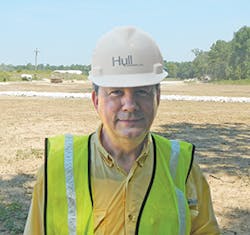John Hull, P.E., believes in balance in mitigating pollution control. There needs to be “an understanding of what is possible and having rules in effect that reflect the realities of our society as a whole,” he says. “We can’t make significant changes to improve water quality in waterways to put it back to where it was 200 years ago, and I don’t think we should.” A principal at Hull & Associates—a project development and engineering firm with seven offices in the Midwest and Pennsylvania—Hull says dramatic changes have been noted in the environment because of anthropogenic activities. “We get excited about it, but nothing in nature is static,” he says. Some actions can hurt the natural process, he adds. “Sometimes there’s a kneejerk reaction to overcompensate—or put a lot of emphasis on one area, and spend a lot of money to initiate a little bit of difference in conditions when spending 50% of that money might get you 75% results. That’s hard to explain to people charged with writing rules to regulate one specific aspect of a pollution range or quality-of-life issue,” he says. For instance, the attention agriculture is getting with regard to water quality is appropriate, “but we can’t forget the efficiencies that have been achieved and the number of people we’re feeding,” says Hull.
Hull & Associates specializes in alternative energy, brownfields, environmental, shale oil and gas, and waste management markets. Hull serves as a senior technical advisor or manager on many projects. Much of the firm’s focus is on urban reclamation and brownfields in the Midwest’s numerous idle or derelict manufacturing properties. Hull also creates new solutions for engineering and environmental water resources and landfill problems. He’s heavily engaged in advocacy with The Nature Conservancy, the Natural Resources Conservation Service, EPA, and state-based environmental agencies on water resources and environmental health issues.
What He Does Day to Day
Hull’s typical day begins by reading emails, followed by phone calls and meetings with junior engineers and project managers reviewing reports and design approaches. He also meets with clients to understand their issues. He enjoys developing technologies that are “used to make things easier and better,” such as alternative daily cover materials (ADCM) for landfills, used in place of soil. Consequently, commercial products have been developed, the acronym has been accepted by EPA, and the practice has been incorporated into many regulations as an equivalent of or acceptable replacement for soil daily cover to reduce erosion and save air space and money. A significant amount of Hull’s time is spent in regulatory advocacy. He provides written or verbal input during hearings on how he believes proposed regulations will impact certain industries and keeps clients informed of the consequences.
What Led Him to This Work
Hull grew up on a farm. Through helping his father and playing in the creeks and springs, he witnessed erosion’s impact. “Time at the beach always teaches you about the interaction between water and soil,” he says of time spent at Lake Erie. Hull earned a B.S. in civil engineering from Ohio Northern University and an M.S. in civil engineering from Stanford University. He founded Hull & Associates Inc. in 1980. Hull also is president of AquaBlok, an environmental products company providing geotechnical material.
What He Likes Best About His Work
Hull enjoys the variety of his work. “I’m a student of unintended consequences,” he says. “It’s interesting to see the interaction of cause and effect in nature. It’s pretty elegant and complicated. We get surprised a lot. I’ve seen a number of regulatory programs with great intentions achieve some of their goals but actually create consequences in other areas that were not anticipated that may be detrimental and hard to solve. It’s always a learning experience.”
His Biggest Challenge
The vast amount of electronic information is a two-edged sword, notes Hull. “In the Information Age, the volume of numbers, articles, and data we can find is interesting and the ability to search on the Internet to find things that would have taken so much longer is valuable,” he says. For Hull, the challenge is in the time it takes to weed out the “noise” from the valuable information.
